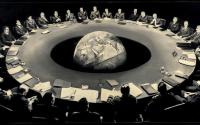28 March 2006Medialens
Forbidden Links: Media, Advertising, Corporate Power And Climate Chaos
Sean O'Grady wrote recently in the ad-filled motoring supplement of The Independent: "in answer to the many letters we get criticising some of our coverage, we don't make cars. We just write about them. [...] We try to concentrate on telling our readers about the many many ways you can enjoy motoring without costing the earth (in any sense)." (O'Grady, 'Sport Utility Vehicles: Don't shoot the messenger. The people who buy SUVs are the problem, not the industry that makes them, or even the motoring press', The Independent, March 7, 2006)O'Grady went on:
"Why so defensive? Because so much of the criticism so dangerously [sic] misses the point. Almost every one of us wants to help to save the planet and almost every one of us wants personal transport."
So who, according to the Independent motoring journalist, is to blame?
"The enemies of the planet, the hypocrites if you will, are not the oil companies that refine the petrol or the car companies that make the vehicles, or the journalists who write about them or the advertising industry that markets them or the bankers who lend us money to buy them. The people to blame are the people who buy cars in the first place, without whom none of the vast industry would exist. Now you know who to write letters to."
This is a facile argument on many levels. For instance, consider that corporations spend billions annually to promote their products and to create new markets around the globe. As philosopher Mark Kingwell notes:
"From the point of view of the corporation, the ideal citizen is a kind of insanely rapacious consumer [driven by a] kind of psychopathic version of self-interest." (Quoted in Joel Bakan, 'The Corporation', Constable, London, 2004, p. 135)
Corporations also 'externalise' the environmental and other costs of their products, minimising or avoiding regulation with government connivance - so that society as a whole, and the planet itself, bears the burden. However, O'Grady's article is quite a significant piece of journalism in that, until very recently, any discussion linking advertising, the media, corporations and environmental collapse was simply off the media's agenda. It is a promising sign that the public recognises that those issues are linked +and+ that the media had better take note.Another example of forbidden connections being made was on BBC Radio 4's Start The Week programme... before swiftly being given the boot. Jacky Law, author of 'Big Pharma' said:
"... the real issues don't get covered [by the media] and I try to show in my book that when you have a parliamentary committee making decisions it doesn't necessarily mean they're adopted by government because the corporate power is just so strong and we need the corporate money".
Andrew Marr, presenter of the BBC programme, responded:
"But we don't talk about that. And, of course, they're very often the people [i.e. the corporations] advertising in the press and in the newspapers in the first place. It's very interesting, the kind of lack of debate at a time, for instance, about the car industry and the future of the car industry. Then you look at the number of car adverts and you begin to wonder, is there a connection? I shouldn't say that, probably." ('Start The Week', BBC Radio 4, January 16, 2006)
Indeed, in a well-rewarded media career - including prestigious stints as BBC political editor and editor of the Independent - Marr has learnt not to dwell on such topics.A similar spark of sanity was quickly snuffed out in the editorial pages of the Independent on Sunday (see our media alert, Climate Change - 'Welcome to Mars (or North Korea!)', January 31, 2006,). We sent a follow-up email on February 12, 2006 to Michael Williams, the deputy editor of the Independent on Sunday (IoS). The subject line of the email was "IoS silence on the news filters that protect power." We wrote:
"You recently maligned readers protesting your paper's fossil fuel-related adverts as 'a curmudgeonly lot of puritans, miseries, killjoys, Stalinists and glooms.' ('A bottle of bubbly for the best way to fly', Independent on Sunday, January 22, 2006)"And, in your column today: 'I thought I'd laid this idea to rest a couple of columns ago', referring to your strawman argument that rejecting advertising 'would almost certainly drive us out of business.' ('On any measure, let's stick to common sense', February 12, 2006)."You dismiss too readily certain uncomfortable facts that have not escaped your readers' attention: the heavy reliance of your newspaper - indeed all the 'quality' press - on advertising revenue [around 75%]. Such dependence is only one of a series of news filters protecting the public from unpalatable truths about state-corporate power in society. This propaganda model of mainstream media, presented by Edward Herman and Noam Chomsky in 'Manufacturing Consent' (1988), has never been mentioned, far less discussed seriously, in the IoS. Why not?"I look forward to hearing from you.best wishes,David CromwellCo-editor, Media Lens"
Williams did not respond and has since steered well clear of such uncomfortable topics in his weekly column. In the meantime, full-page colour ads from 'green giant' BP continue to fill the pages of the Independent. Coincidentally, or otherwise, Jeremy Warner, the Independent's business editor, staunchly defended BP when it announced huge £11 billion profits last month:
"From a moral perspective, some would see it as indefensible to be propping up our pensions by polluting the planet. Yet from where I sit, this seems a rather better use of the money than that suggested by the NEF [New Economics Foundation], which proposes a massive windfall tax with the proceeds to be applied first and foremost to developing renewable sources of energy and if there's anything left after that, the monies to go to the special global fund set up to help poor countries adapt to climate change."
Warner spelled out what he thought from the vantage point of his plush corporate-funded seat:
"It is a continued curiosity of utopian thinking of this type that it hasn't yet grasped that the market provides the best possible hope of eventually achieving these ends. More money is already being thrown at renewables and energy efficient technologies than the system can possibly cope with or is ever likely to produce a return, a state of affairs that will only be accentuated by President George Bush's State of the Union commitment to end America's addiction to oil." (Jeremy Warner, 'Don't condemn BP's oil gusher. Polluter or not, this is a company for Britain to be proud of', The Independent, February 8, 2006)
Taking the statements of political leaders at face value is a defining characteristic of the corporate media. So too are the bizarre notions that corporations and 'free' markets, heavily skewed to serve the corporate interest, will 'save humanity'. Law professor Joel Bakan interjects a note of rationality:
"The 'best interests of the corporation' principle, now a fixture in the corporate laws of most countries [compels] corporate decision makers always to act in the best interests of the corporation, and hence its owners. The law forbids any other motivation for their actions, whether to assist workers, improve the environment, or help consumers save money." (Bakan, op. cit., p.37)
The last despairing hope of blinkered media is that shifting a few chairs around at the top of the establishment will save the planet. Thus, the Independent on Sunday hails 'green Chancellor' Gordon Brown's recent Budget as "moving in the right direction", indicating that "he is becoming increasingly engaged with climate change."The IoS editorial continues in the same vein:
"He [Brown] realises that the period when he hopes to be prime minister - running up to about 2013 - will be the last chance for tackling it, if it is not to run out of control. As his record on world poverty shows, he is tenacious and imaginative when he becomes committed to a cause."(Editorial, 'Gordon and the green giant', Independent on Sunday, March 26, 2006)
We doubt whether any Independent journalist would publicly brand such a deluded flight of fancy from their own editors as "utopian thinking".Market 'sovereignty', an unhealthy fixation on economic 'growth', and the benign intent of corporate and political leaders are unshakeable articles of faith for profit-led media editors and journalists. It is little wonder that such media professionals will forever dispel any critical discussion of present policies, and possible sane alternatives, to the realm of "utopian thinking".
SUGGESTED ACTION
The goal of Media Lens is to promote rationality, compassion and respect for others. In writing letters to journalists, we strongly urge readers to maintain a polite, non-aggressive and non-abusive tone. Write to Sean O'Grady of the Independent:Email: [email protected]Write to Jeremy Warner, business editor of the Independent:Email: [email protected]Write to Michael Williams, deputy editor of the Independent on Sunday:Email: [email protected]Write to Simon Kelner, editor-in-chief of the Independent & Independent on Sunday:Email: [email protected]Write to Andrew Marr, BBC presenter:Email: [email protected]
Please also send copies of all emails to Media Lens:Email: [email protected]
This is a free service but please consider donating to Media Lens: http://www.medialens.org/donate.html






